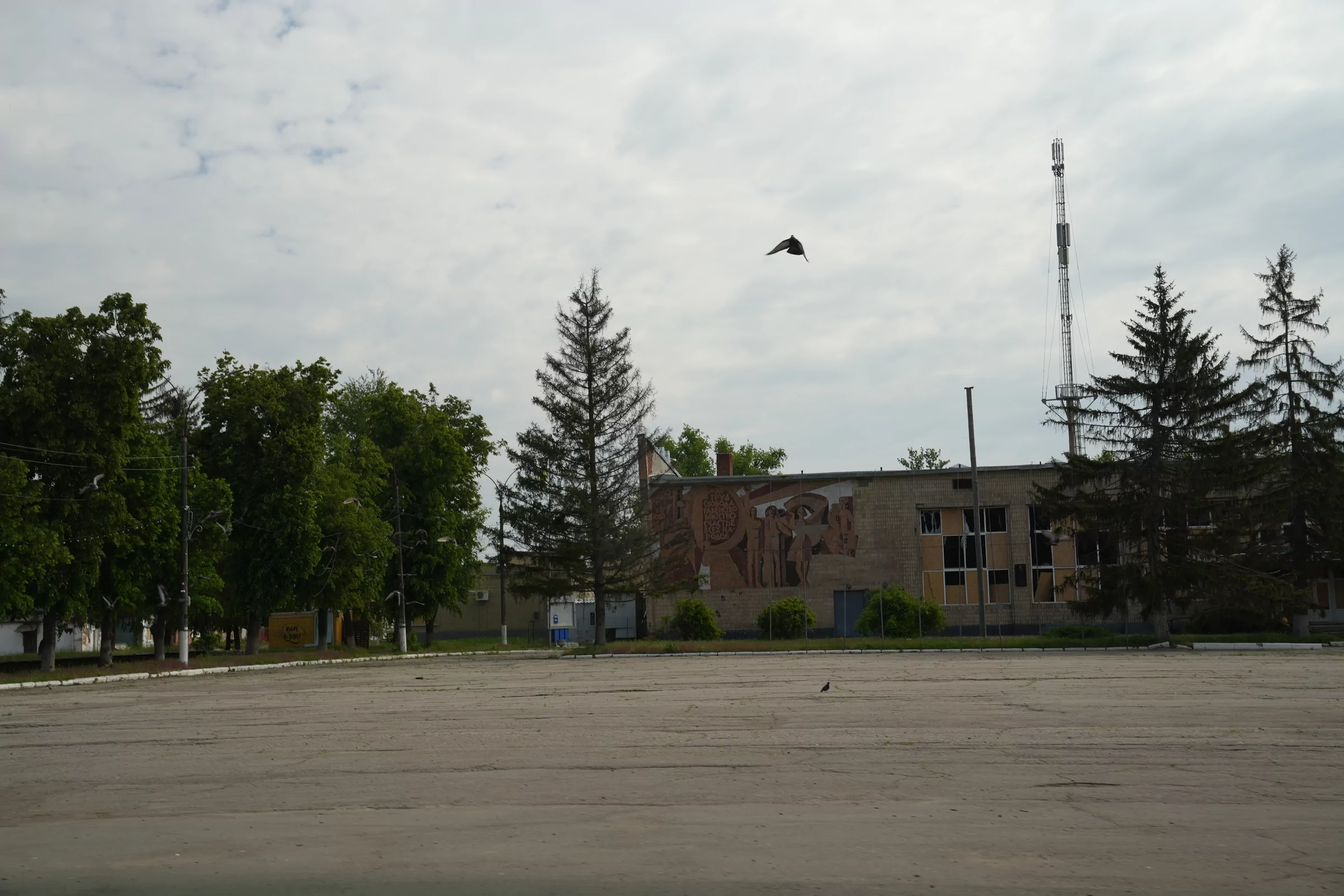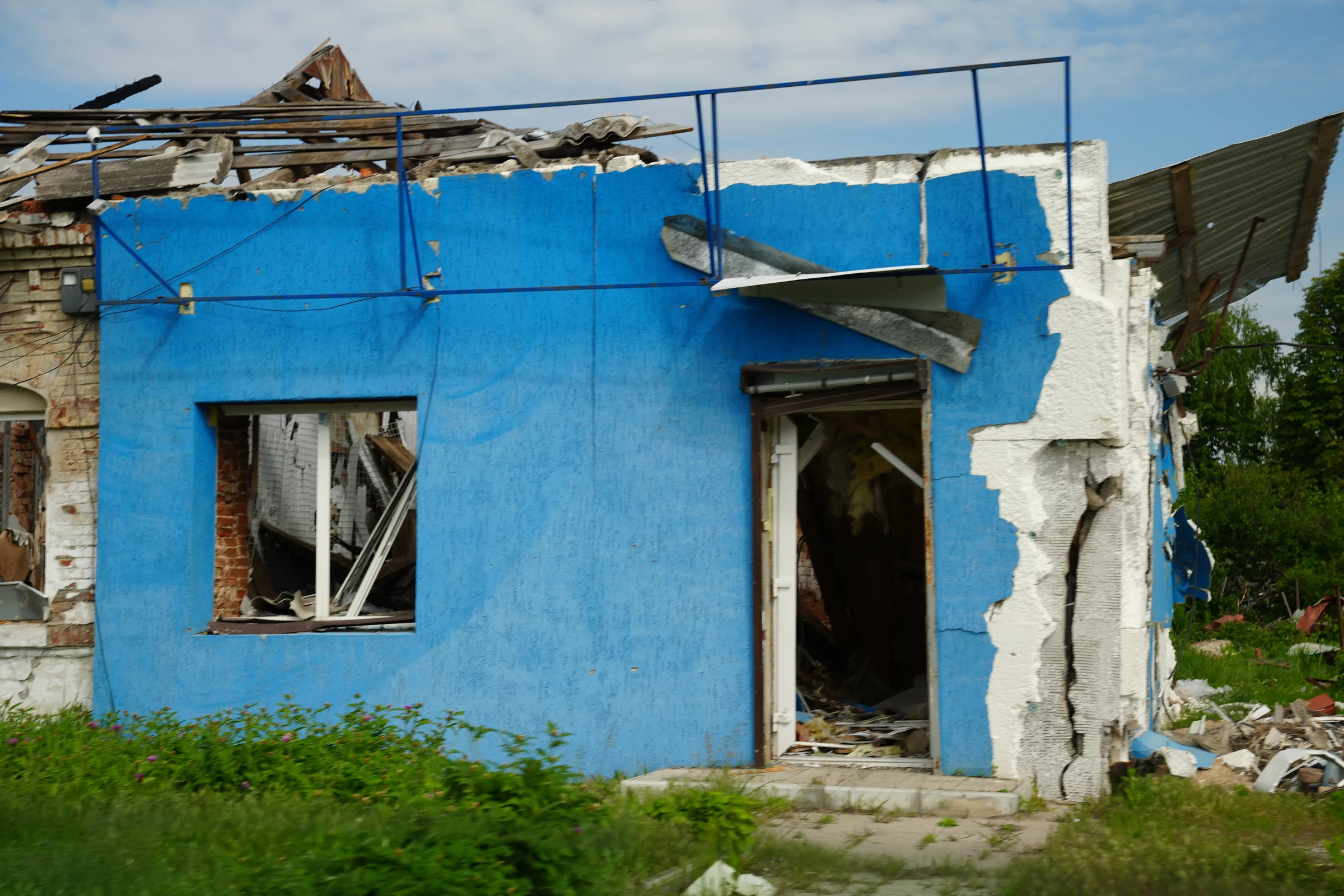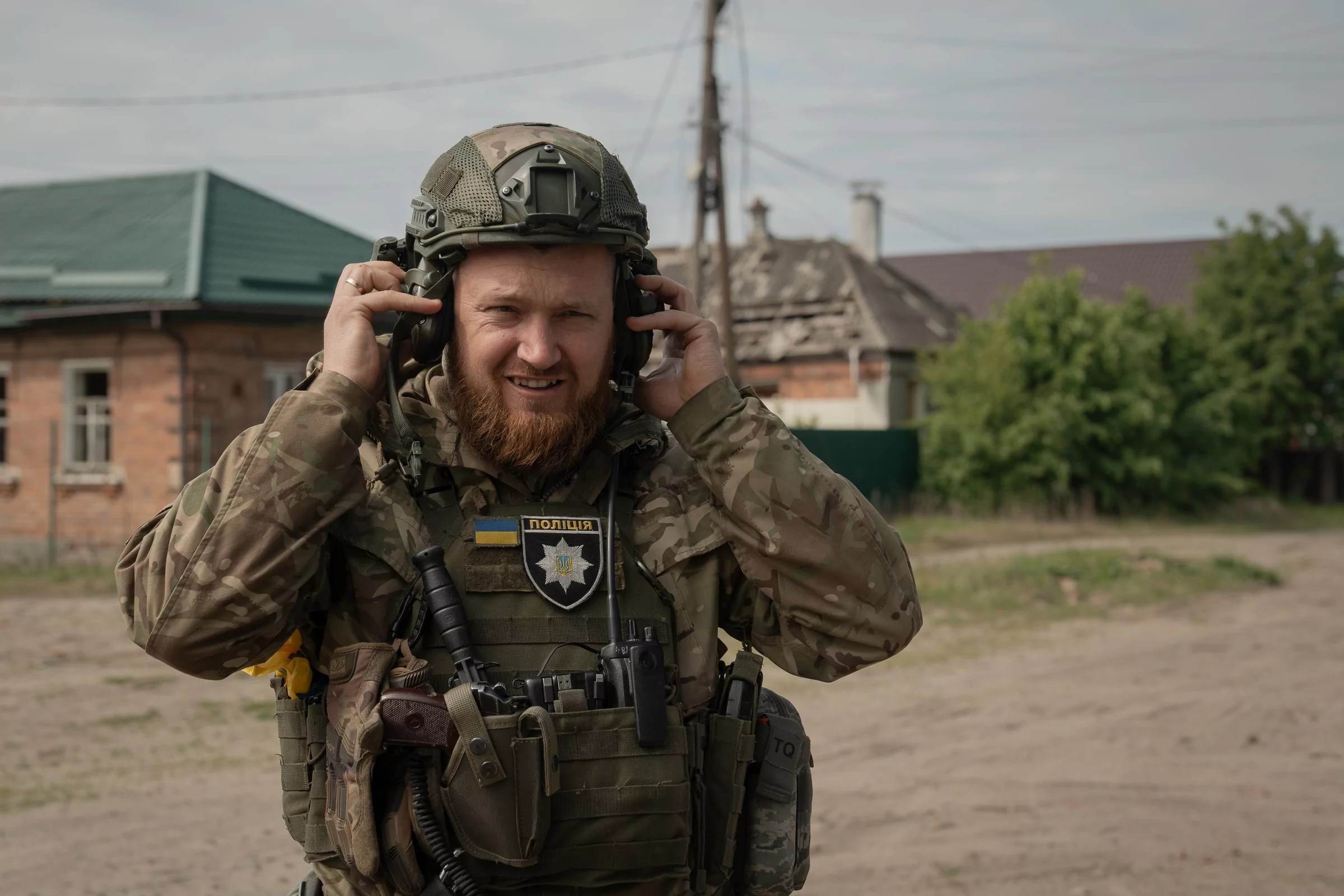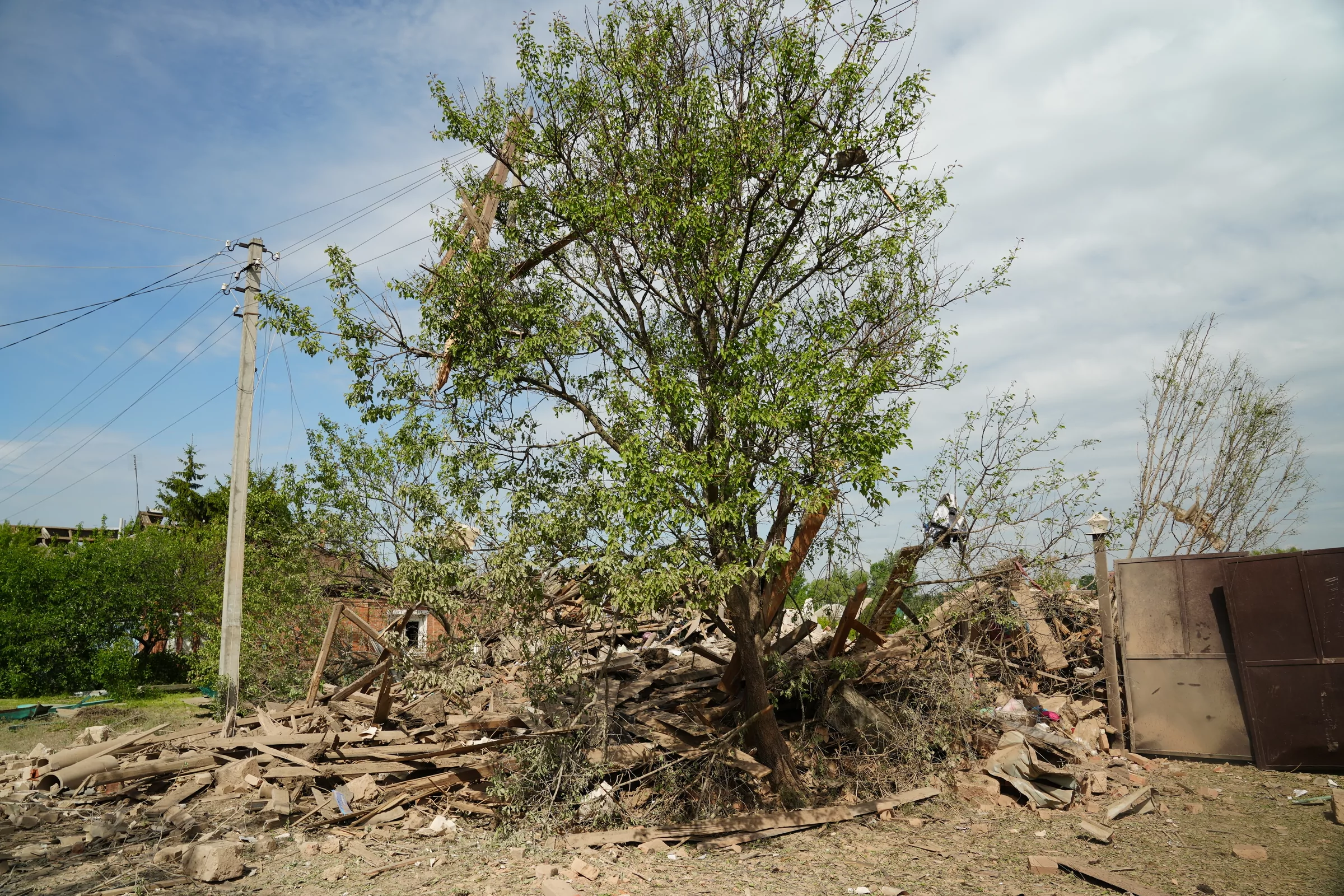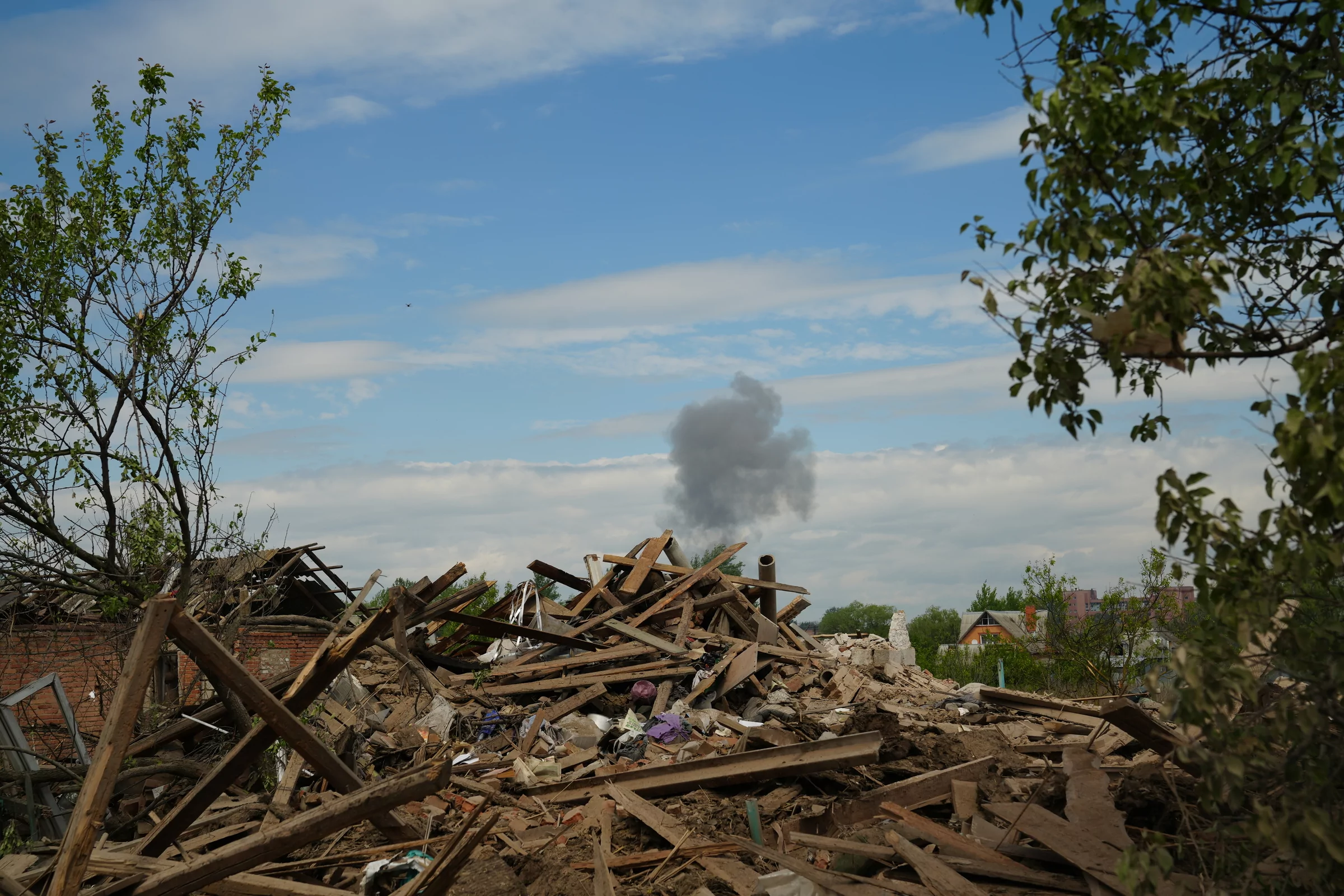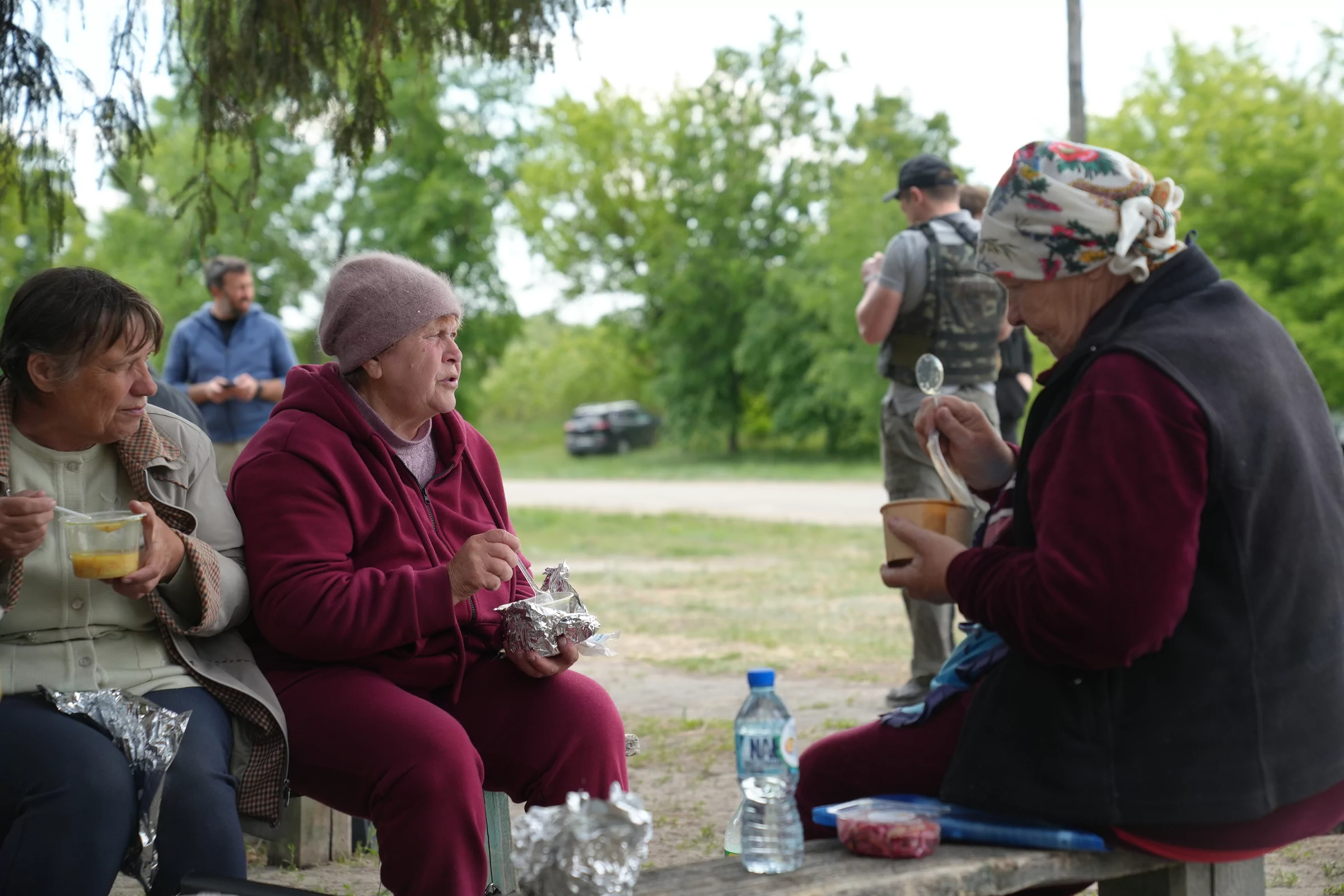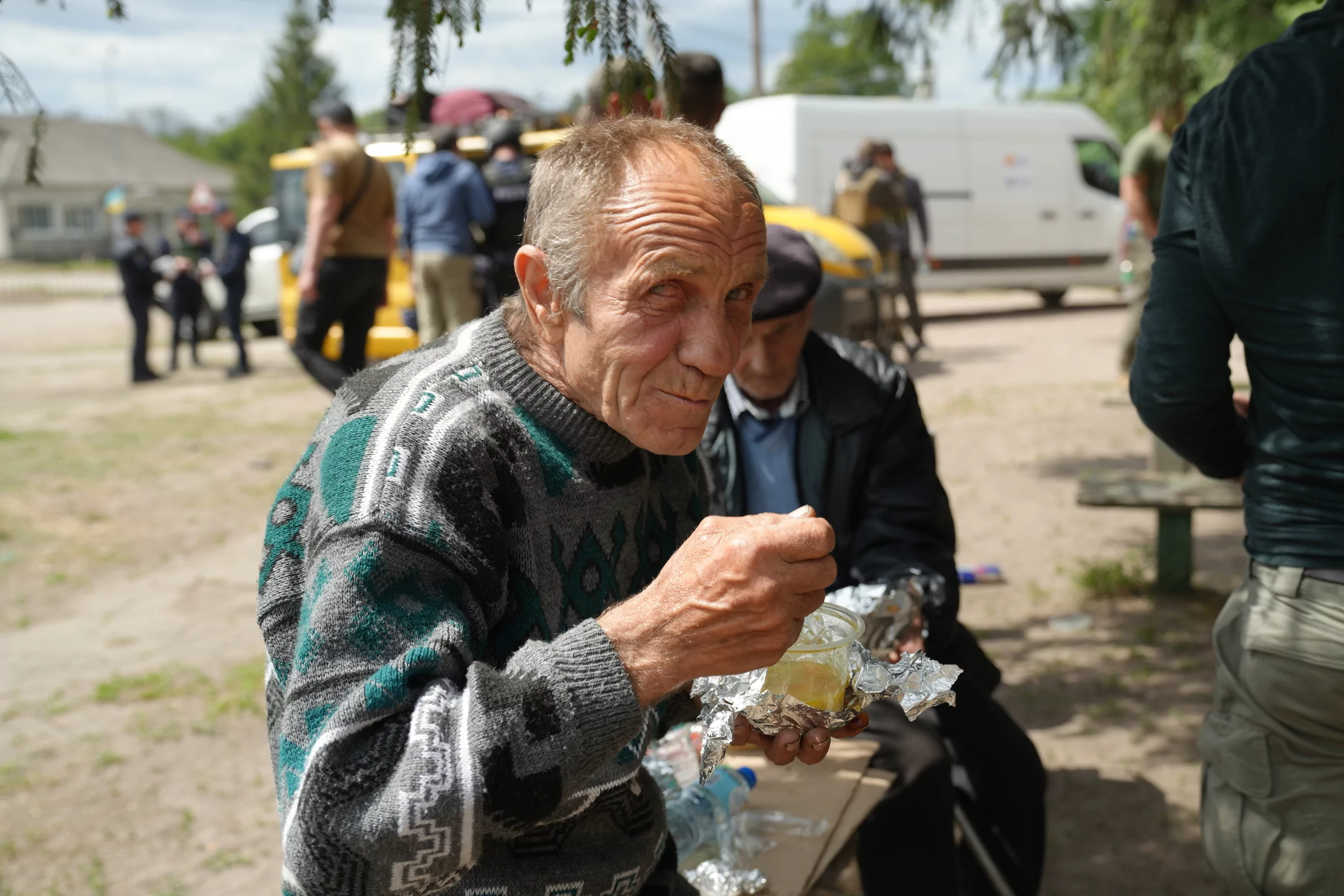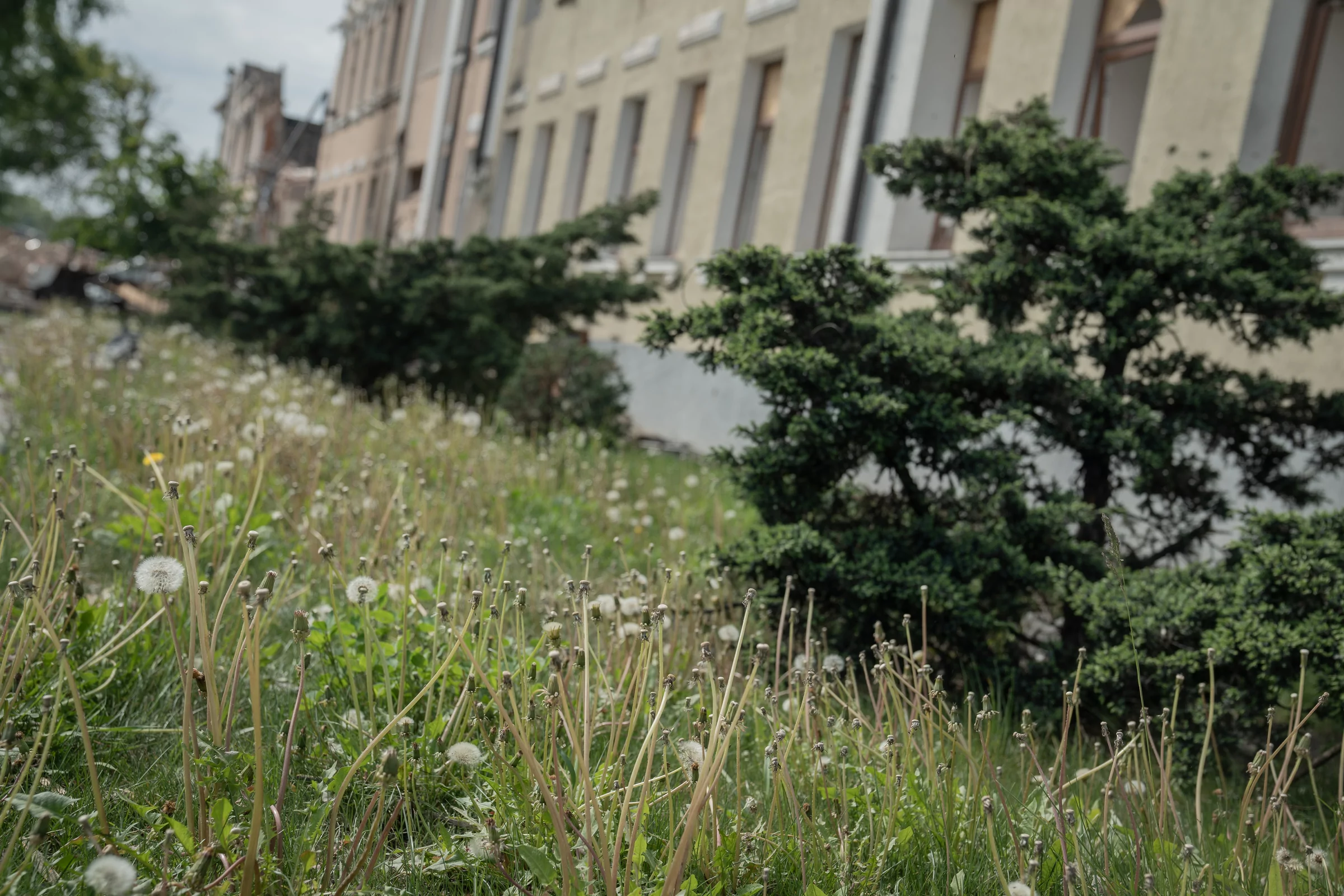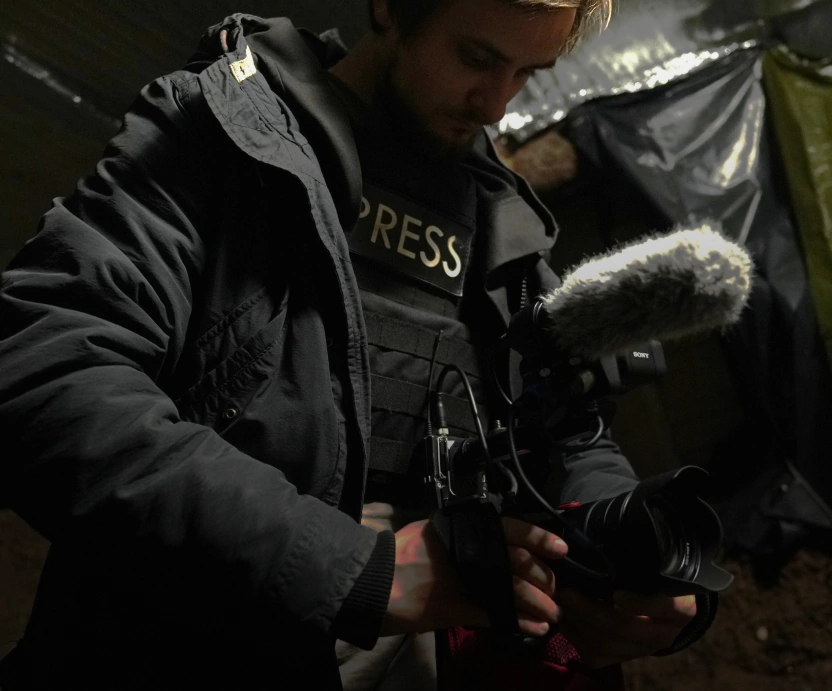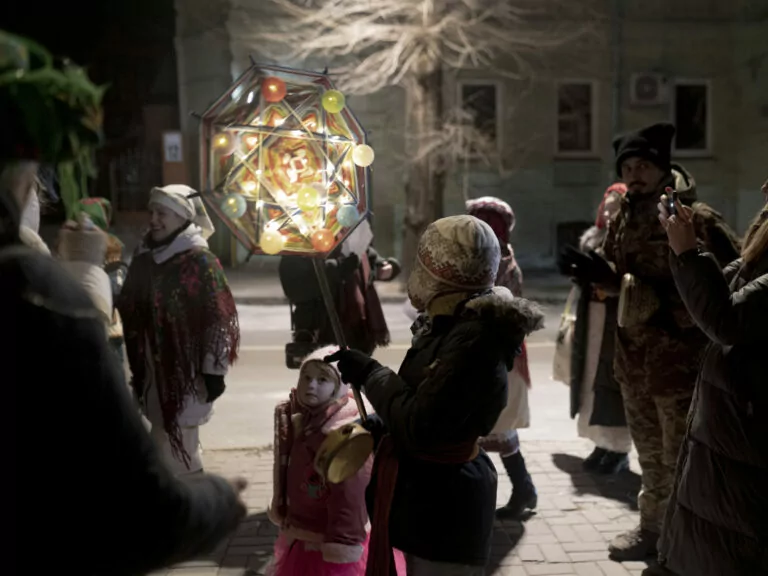Editor’s Note: Some of the names in the story are changed because of safety considerations.
Tetiana’s hug with her husband is short. After just a moment, she briskly gets into a police car with a sticker on the bumper that says, “I am here to protect.”
“I don’t want to leave, but it’s very scary. I fear that those would get in,” she says as the high-rise apartment buildings of Vovchansk move past the car. Russian artillery blackened and cut their walls. Explosive waves from multiple glide bombs blew out their windows.
Dmytro Nosach, a police officer of the Vovchansk community, is tasked with getting Tatiana out of here, towards safety, which is relative in the northern parts of Kharkiv Oblast.
“You’ve been in occupation?”
“Yes,” Tetiana replies, “I was, and then I left.” Tetiana’s tears don’t stop. She doesn’t stop trying to wipe them off her face.
Tatiana speaks about her husband, who stayed home because he wants to keep working. About being terrified to leave her house, frozen by the havoc and destruction Russians brought upon Vovchansk. “I’m having a nervous breakdown already.”
Vovchansk is the first big city in the way of Russia’s new assault on the Kharkiv Oblast and, potentially, Kharkiv. Its pre-war population was about 17,500 people. Russians occupied the city on the first day of the full-scale invasion, and the Ukrainian army liberated it during the Kharkiv counteroffensive in September 2022.
Not everyone came back. Vovchansk is just 5 km [3.1 miles] from the Russian border, so it came under their fire constantly. Even more so since December 2023: back then, Russians have started frequently hitting the Kharkiv region with heavy glide bombs [KABs].
When Russia pushed into the region’s border towns and villages from the north on May 10, 2024, just 3,000 people lived there.
“Right now, about 1,500 remain,” Oleksii Kharkivskyi, the head of Vovchansk police, told Gwara Media, standing in the middle of the city’s street. Gwara joined him and his colleagues to report on the ongoing evacuation from Vovchansk and nearby border settlements.
At the time of publishing this report, on May 14, just 200 remained in Vovchansk. Police, emergency services, and volunteers managed to evacuate up to 5,900 people from the city and the nearby settlements.
As of now, Russia relentlessly strikes the region with artillery and glide bombs to support their offensive, killing and injuring civilians and destroying their homes.
Oleksii speaks in the middle of the street in Vovchansk and updates on what’s happening in the city. He’s been doing it since the launch of a new offensive: posting his updates to calm people down in the face of Russian disinformation about Russian soldiers already walking around Vovchansk.
There were no Russian soldiers in the city on May 11. Only rubble left by their deadly, heavy glide bombs hitting the city, the buzzing of their drones in the sky. [On May 13, heavy fighting reported in Vovchansk’s northern outskirts.]
Oleksii and the entire local National Police force, along with non-governmental organizations and volunteers, help to evacuate residents of the border villages from under Russian bombs. People who want to leave connect to NGOs or call emergency services to apply for evacuation. Sometimes, their relatives do that for them, and as the car arrives, people refuse to go.
“Russia is committing a crime that can’t be forgiven here. 500 kg bomb,” Ihor, a Vovchansk resident, says, waving his hand at the crumble of his neighbor’s house. A glide bomb destroyed most of it to the ground last night. Its wreckage is still smoldering; white smoke rises up to the sky. It’s hard to breathe here. “What do they think is here, a torpedo boat base?”
Ihor remembers 2022 and the occupation well. “When the [Russian soldier] has a rifle, all decorated with grenades… You want to jump on him and snatch just one so much,” Ihor grins, and the tears well up in his eyes.
During the Russian occupation, he didn’t take a grenade from a Russian, however tempting it was. Ihor’s wife and generations of her family lived in the city, and he couldn’t risk their life.
He is set on staying in the city.
“You have to live, work, and love standing [tall]. Nothing can be done when you’re kneeling.”
His neighbor, Serhii, the one with the house destroyed by a glide bomb last night, also refuses to evacuate — because of his three goats.
“I don’t want to kill them,” he explains to journalists, injured, covered in soot. “But if I don’t, the goats will run around and mess with my [neighbors’] garden.” Serhii doesn’t want the neighbors to hate him for it.
His wife is in the intensive care unit in one of Kharkiv’s hospitals with injuries to her head and chest. Soon, Serhii will know that doctors pulled three pieces of shrapnel from her body.
“We don’t have a place for goats, only for people,” Oleksii Kharkivskyi says. Serhii doesn’t leave with them now, but tomorrow, he’ll agree to evacuate.
Serhii has diabetes. It’ll be a challenge to manage it on his own, homeless, dazed with post-concussion syndrome in a heavily bombed city. Ihor worries Serhii’s sugar will drop, and he’ll go into a coma. Another Vovchansk resident, Oksana, stops near the smoking skeleton of the house and promises to bring Serhii an insulin syringe. His were destroyed with most of his home.
During the occupation, Russians took Oksana’s son for a month and tried to take her brother. She doesn’t want to leave now, too. Wants to stay, help the elderly and disabled people in the city.
“I trust in our boys,” she says, “I think they will not allow [Russians] to get in here. We’ve already been under them, though. They brought nothing good here.”
Vovchansk has its own history of Russian atrocities, like many cities and towns they controlled in Ukraine. Russians have turned the machine-building plant in the city into a “concentration camp,” a place for detention, torture, and murder of Ukrainian soldiers, law enforcement officers, and civilians. Ukrinform reported the plant became the largest torture chamber on Russian-occupied territories of the country.
“Some people say, under occupation, it was quiet, there wasn’t shooting,” Oksana says. “I say, look at what they did to Saltiv—”
“KABs!” Oleksii shouts.
Three glide bombs hit the ground. The second explosion is the loudest: the ground shakes. After getting “all clear” from the police (their tactical headphones help them hear the “whoosh” of glide bombs when they are far away), Oksana stands up from under the tree, pulls her hood up, gets her bike, and leaves.
Three pillars of gray smoke rise up to the blue sky.
The next evacuation request is from the green, sunlit street. Police bang on the gates of the house, ask around.
People who wanted to leave have already done so: one woman left alone, and a son picked up the other.
Yulia, who explains that to the officers, lives across the street. She decided to remain in the city with her elderly parents, pets, and animals and provide “the street committee” — people living nearby — with electricity with her generator. The power supply in Vovchansk has not been stable since the Russians destroyed the energy system of Kharkiv Oblast in March 2024.
“We’re used to it,” Yulia says about Russian bombardment. “We [learned to listen] for a hit. Hear what, when, and how [will attack]”.
Three more glide bombs hit the city. The smoke can’t be seen from here. Yulia says, “It’s not the first time. They’ve been bombing us since December.”
At the next stop, police pick up Oleksandr, upset and tearful. He evacuates with a single bag in his hand. Police rushes him towards the car when another set of glide bombs hits in the distance. They need to get him out of danger.
A resemblance of safety is a coordination center in a village south of Vovchansk, a mid-point between heavily bombarded border settlements and Kharkiv.
It’s different kind of loud here: volunteers provide people with food, register them as evacuees. Some people are talking. Some are keeping to themselves, eyes stuck on the ground.
Hanna Zavoloka from the Proliska humanitarian mission says evacuation was slow, but the pace of it picked up rapidly after Russians bombed the region through the night of May 10.
“People are terrified,” Hanna says.
“Usually, it’s not easy to evacuate the elderly: they don’t want to abandon their lives and homes. “This time, they ask for [evacuation] on their own. ‘Get me out,’ ‘get me out,’ ‘we don’t want to live through what we have lived again.'”
Hanna thinks Russians might attempt to move further into the region, but the Ukrainian army will stop them. “We’ve already lived through worse,” she says.
Valentina, 66, with a bright red kerchief wrapped around her head, has just arrived from Bilyi Kolodiaz, a village in Vovchansk’s suburbs. She sits on a bench in the shadow of a large tree and tells the police officers her name, address, and date of birth.
“What’s holding me here? My husband is gone, died,” Valentina’s voice softly breaks up with tears. She actually has a sister back home. Her sister refused to leave the village. “She said she will stay there until the end.”
Valentina plans to go to Kharkiv (to the eldest daughter) and then to Poland (to the youngest). She’s already been to Poland this year and wanted to stay here. She got so sick that she thought she’d die there — and returned home to get better.
Now, she has to leave again. “I thought it’d pass us by, but it hasn’t. That’s how it is. Maybe everything will be fixed, and I’ll come back.”
Another evacuee, Petro, 68, just came from Vovchansk. He’s eating the soup volunteers prepared for him.
“Who the hell needs this city? No one. That’s why no one defended it [in 2022]. Russians just got in, and that was it.”
Ukrainian intelligence expected an assault from the north here. Russians are attempting to stretch the frontline, force Ukraine to relocate troops to the Kharkiv region, and use the regrouping to their advantage in Donetsk and Luhansk Oblasts. The Ukrainian military doesn’t think Russians have the resources to take Kharkiv, but the closer they are to the city, the easier it is for their artillery to reach it.
As of May 13, five battalions of the Russian troops are fighting to take Vovchansk. The Ukrainian army is holding off the offensive, both there and on the Lyptsi axis east of the city, despite Russian tactical and partial successes. “Just getting in” is not possible.
Petro says he stayed “as long as possible” at home and now has to flee.
“I’ve spent months in occupation. I don’t want more. I’m going to run. Going to flee Russia.”
“I didn’t like it when Russians [were here]. Their bread is terrible; their sausages aren’t good. And their people… How did they get so rotten?”
Petro’s wife comes and rushes him to the bus.
“I haven’t finished,” he says, nodding at the soup.
“So take it with you!” Liuba walks away. Petro stands up and starts to gather his things.
It’s their turn to move farther away from home.
They’ll drive to Kharkiv through heavy smoke rising from forest fires caused by Russian shelling.
UPD from May 15, 09:38 a.m.: Title’s wording simplified.
Denys Klymenko, reporter and videographer in Gwara Media, contributed to the article.
Hi, it’s Yana Sliemzina, and this was my first field report from the place that’s that close to the frontline. Thank you for caring about what’s happening in the Kharkiv region in the wake of the Russian assault from the north. I still haven’t processed how I feel about working under 14 glide bombs/hour. Our Kharkiv-based newsroom won’t stop, though: we’ll keep informing you of what Russia does to our home. Please, consider supporting us on Patreon, BMC, or PayPal.
